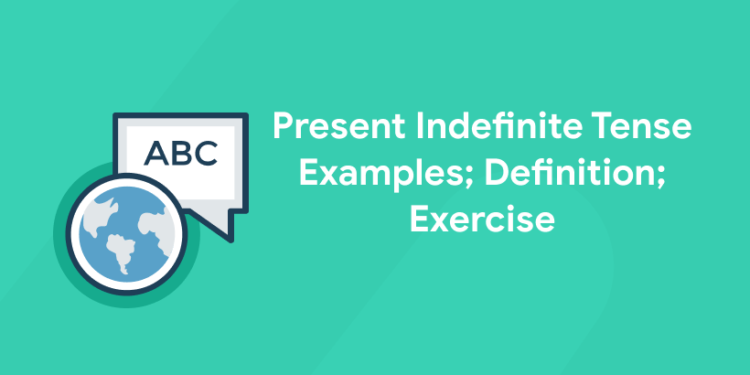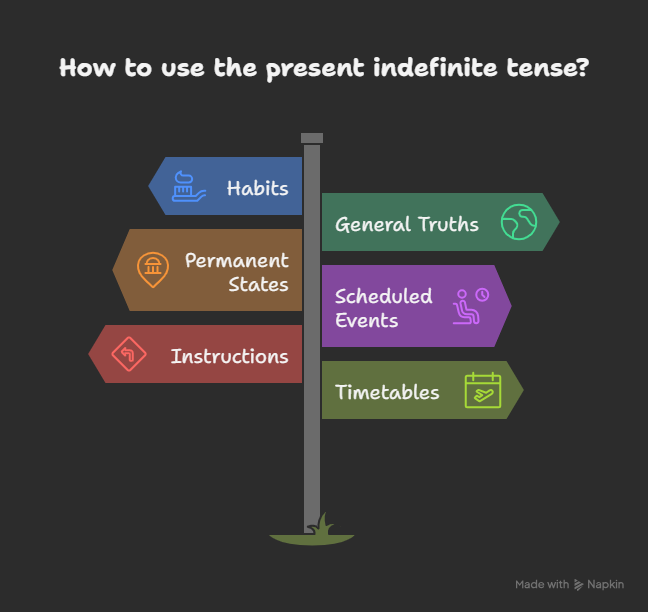Table of Contents
If you are learning the English language, then grammar topics are of the utmost importance. Grammar is the skeleton of all languages. Knowing grammar rules is essential for clear communication. Reading, writing or speaking; whatever the medium might be, it is essential to learn grammar rules if you want to make sense. The present indefinite tense, i.e. simple present tense, is one of the most commonly used tenses in the English language. They are generally used for describing actions that are habitual or recurring. This might sound simple. But still, many users struggle with the correct usage of the Present indefinite tense. In this Present Indefinite Tense Examples blog, we will learn:
- Definitions
- Everyday examples
- Practical exercises
We will help you master the topic of the present indefinite tense and use it with confidence.
Click here to register for the Entri Elevate spoken English online course! Join today!
Present Indefinite Tense Examples: Introduction
Do you want to be fluent in English? Then learning grammar is essential! And in that, mastering verb tenses is non-negotiable. In that topic, the most important one is none other than the Present Indefinite Tense (also known as the Simple Present Tense). The use of these words is for expressing habitual actions, general truths, scheduled events, and much more. This guide provides you with the clarity you need on this topic in a simple and understandable way, independent of your expertise in the language. You will find this blog useful if you are a student looking for resources to learn grammar, a teacher researching to prepare their teaching materials or just an amateur English learner seeking clarity.
This guide will provide everything that will help you reinforce your understanding of the grammar lesson Present Indefinite Tense. We have:
- Clear explanations
- Practical examples
- Interactive exercises
All of this together will definitely help you improve your grammar knowledge and skills.
Present Indefinite Tense: Definition
1: Which of the sentences below is grammatically correct?
The Present Indefinite Tense is used to describe actions or states that are:
- Habitual
- Universally true
- Regularly recurring
They are also applicable to scheduled events such as timetables or itineraries.
The structure of the Present Indefinite Tense is as given in the table below.
| Sentence Type | Structure | Example(s) |
| Affirmative | Subject + base verb (add -s / -es for he/she/it) |
|
| Negative | Subject + do/does + not + base verb |
|
| Interrogative | Do/Does + subject + base verb? |
|
The usage of the present indefinite tense can be better understood if you read the table below.
| Usage | Example |
| Habits or repeated actions | I drink tea every morning. |
| General truths or scientific facts | Water boils at 100 °C. |
| Permanent states | She lives in London. |
| Scheduled events (future) | The train leaves at 9 PM. |
| Instructions or directions | You take the first left, then you walk straight. |
Spoken English Course for Guaranteed Confidence and Career Growth
Spoken English Course by Entri App: Enhance your communication skills, gain certification, and boost your career with confidence.
Join Now!Present Indefinite Tense Examples
Some examples of the present indefinite tense according to different usages are listed below.
| Category | Example Sentences |
| Habits / Routines |
|
| General Truths / Facts |
|
| Permanent or Long-term States |
|
| Scheduled Events (Future) |
|
| Instructions / Directions |
|
Present Indefinite Tense Exercise
Some exercise questions for the present indefinite topic are given below. Try filling in the blanks given and then cross-check your answer sheet with the answer key provided below.
- She ______ (go/ goes/ went) to yoga classes every Saturday.
- I usually ______ (has/ have/ had) cereal for breakfast.
- Birds ______ (migrate/ migrating/ migrated) south during winter.
- He ______ (do not watch/ will not watch/ does not watch) TV on weekdays.
- ______ (Do you play/ will you play/ have you) tennis every weekend?
- The library ______ (open/ opening/ opens) at 9 AM sharp.
- Water ______ (do not boil/ does not boil/ will not boil) at 90 °C.
- The train ______ (leave/ leaves/ leaving) at 10 o’clock.
- Cats ______ (like/ likes/ liked) milk.
- They always ______ (get/ gets/ getting) up early.
Learn English grammar topics from experts in the field! Join the Entri Elevate online course!
Present Indefinite Tense Exercise Answers Key
Have you done the exercise given above? Were you able to answer all the questions? Now compare your answers to the answer key given below.
- goes
- have
- migrate
- does not (doesn’t) watch
- Do you play
- opens
- does not (doesn’t) boil
- leaves
- like
- get up
How many did you manage to get right? Where did you make mistakes? Talk with a mentor and rectify any doubts you have about the topic, Present Indefinite Tense. Trying to improve your English skills. Join Entri Elevate Spoken English online course to learn grammar topics from expert mentors.
Join Entri Elevate’s spoken English online course to learn English grammar topics!
Spoken English Course for Guaranteed Confidence and Career Growth
Spoken English Course by Entri App: Enhance your communication skills, gain certification, and boost your career with confidence.
Join Now!Present Indefinite Tense Examples: Conclusion
The Present indefinite tense or the simple present tense is a very important part of English grammar. Understanding its usage correctly is one of the first things you have to do as a learner of English. Present Indefinite Tense Examples help you understand how to express daily routines, habits, and general truths. All the information provided in this Present Indefinite Tense Examples blog will help you practice and reinforce this topic in your mind and hence achieve accuracy and fluency.
Spoken English Course for Guaranteed Confidence and Career Growth
Spoken English Course by Entri App: Enhance your communication skills, gain certification, and boost your career with confidence.
Join Now!Frequently Asked Questions
How can I avoid overusing the Present Indefinite Tense?
You can avoid overusing the Present Indefinite Tense by following the tips given below.
- Vary your verb tenses according to context (e.g., use Present Continuous for ongoing actions).
- Avoid adding unnecessary keywords (like “always” or “every day”) unless they add meaning.
- Use other structures (e.g., “I’m having lunch right now” for current action instead of “I have lunch now”).
Can “Simple Present” be used for future events?
Yes! Especially in contexts like timetables and schedules (e.g., The plane departs at 6 PM).
When should I use does vs do?
Use does with third-person singular subjects (he, she, it), and do with I, you, we, they.
Is there a difference between “Present Indefinite” and “Simple Present”?
No! Both terms refer to the same tense.
Why do we add ‑s or ‑es to the verb in the third-person singular?
It’s a grammatical rule of English that distinguishes he/she/it from other subjects in the simple present (e.g., John dances, He watches, She fixes).










